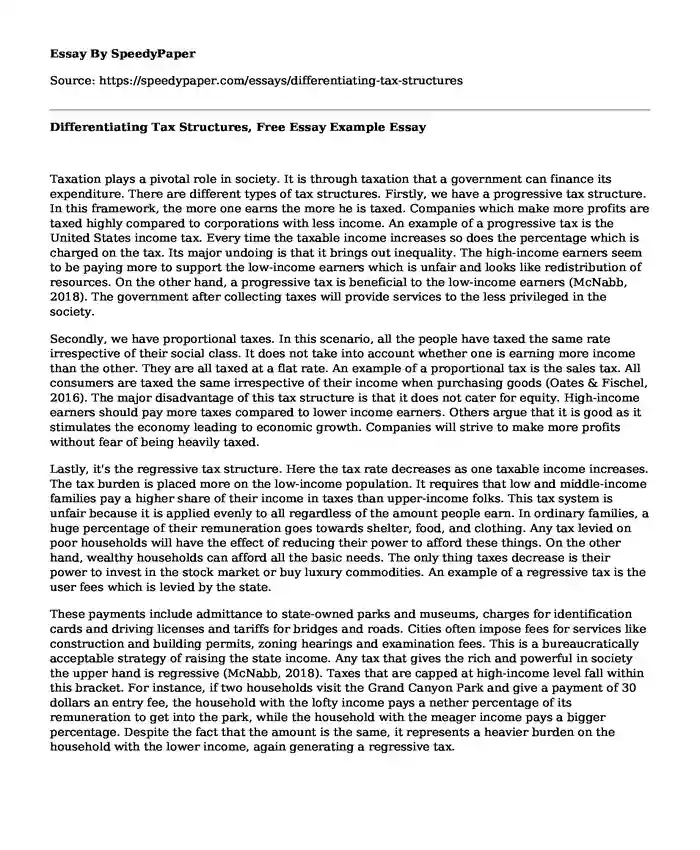
| Type of paper: | Essay |
| Categories: | Tax system |
| Pages: | 3 |
| Wordcount: | 623 words |
Taxation plays a pivotal role in society. It is through taxation that a government can finance its expenditure. There are different types of tax structures. Firstly, we have a progressive tax structure. In this framework, the more one earns the more he is taxed. Companies which make more profits are taxed highly compared to corporations with less income. An example of a progressive tax is the United States income tax. Every time the taxable income increases so does the percentage which is charged on the tax. Its major undoing is that it brings out inequality. The high-income earners seem to be paying more to support the low-income earners which is unfair and looks like redistribution of resources. On the other hand, a progressive tax is beneficial to the low-income earners (McNabb, 2018). The government after collecting taxes will provide services to the less privileged in the society.
Secondly, we have proportional taxes. In this scenario, all the people have taxed the same rate irrespective of their social class. It does not take into account whether one is earning more income than the other. They are all taxed at a flat rate. An example of a proportional tax is the sales tax. All consumers are taxed the same irrespective of their income when purchasing goods (Oates & Fischel, 2016). The major disadvantage of this tax structure is that it does not cater for equity. High-income earners should pay more taxes compared to lower income earners. Others argue that it is good as it stimulates the economy leading to economic growth. Companies will strive to make more profits without fear of being heavily taxed.
Lastly, it's the regressive tax structure. Here the tax rate decreases as one taxable income increases. The tax burden is placed more on the low-income population. It requires that low and middle-income families pay a higher share of their income in taxes than upper-income folks. This tax system is unfair because it is applied evenly to all regardless of the amount people earn. In ordinary families, a huge percentage of their remuneration goes towards shelter, food, and clothing. Any tax levied on poor households will have the effect of reducing their power to afford these things. On the other hand, wealthy households can afford all the basic needs. The only thing taxes decrease is their power to invest in the stock market or buy luxury commodities. An example of a regressive tax is the user fees which is levied by the state.
These payments include admittance to state-owned parks and museums, charges for identification cards and driving licenses and tariffs for bridges and roads. Cities often impose fees for services like construction and building permits, zoning hearings and examination fees. This is a bureaucratically acceptable strategy of raising the state income. Any tax that gives the rich and powerful in society the upper hand is regressive (McNabb, 2018). Taxes that are capped at high-income level fall within this bracket. For instance, if two households visit the Grand Canyon Park and give a payment of 30 dollars an entry fee, the household with the lofty income pays a nether percentage of its remuneration to get into the park, while the household with the meager income pays a bigger percentage. Despite the fact that the amount is the same, it represents a heavier burden on the household with the lower income, again generating a regressive tax.
References
Engler, P., & Strehl, W. (2016). The Macroeconomic Effects of Progressive Taxes and Welfare. SSRN Electronic Journal. Doi: 10.2139/ssrn.2881186
McNabb, K. (2018). Tax Structures and Economic Growth: New Evidence from the Government Revenue Dataset. Journal of International Development, 30(2), 173-205. Doi: 10.1002/jid.3345
Oates, W., & Fischel, W. (2016). Are Local Property Taxes Regressive, Progressive, or What? National Tax Journal, 69(2), 413-434. Doi: 10.17310/ntj.2016.2.06
Cite this page
Differentiating Tax Structures, Free Essay Example. (2022, Sep 15). Retrieved from https://speedypaper.net/essays/differentiating-tax-structures
Request Removal
If you are the original author of this essay and no longer wish to have it published on the SpeedyPaper website, please click below to request its removal:
- Erikson's Theory of Development, Free Essay in Psychology
- Business Essay Sample on the Walmart's Case Studies
- Free Essay about Power Transition: China vs. India
- Essay Sample on the Topics of Socialization and the Impact of the Media on a Child's Behavior
- Cooking Essay Example: How to Make a Baked Alaska
- Essay Sample on Manual Repositioning Strategies
- Paper Example of Interviews: A Native American and American Divorced Parent
Popular categories




